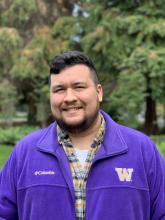By Tony Garcia
It’s a typical late winter afternoon in Seattle, overcast skies with some gentle rainfall. I’m at my favorite Indian restaurant on the ave, and the familiar smell of garam masala and star anise fills my head while I scroll through my phone to pass the time until my food arrives.
A familiar voice cuts through my focus, and I look up to see Damien Beecroft and Arvid Levander asking to join me at my table. They sit down and the conversation naturally turns to their current research and future goals and aspirations.
Arvid spoke a bit about his work in optimization and PDEs, as well as adjusting to life in Seattle from both Sweden and Florida. Being a near lifelong Washingtonian, I told him about how I didn’t believe in the Seattle Freeze and spoke about the numerous concert venues I’ve been to in Seattle.
Damien talked about his interest in industrial ecology, an area that I don’t, and (very) likely never will become an expert in. However, I was intrigued. I’ve always enjoyed hearing others speak about what they’re interested in or researching, so I asked Damien to tell me more about his field.
His research focuses on using data on global trade to model emission ramp down scenarios at the product level. Or, where methods of production can be changed and adjusted in order to meet climate goals.
When broken down into bits that I was able to understand, it reminded me of what I feel makes this department amazing, and why I consider myself lucky to work with these people daily. Every student that passes through our building has dreams and aspirations in life, and when they share those with me, I get a small glimpse into the problems the world faces and ways they hope to solve it.
In a world with a lot of problems and mysteries, there are plenty of paths for students to take. Whether it’s helping to curb climate change, unraveling the mysteries of cancer and other diseases, expanding the worlds of machine learning and artificial intelligence, or continuing on in academia to help the next generations step up to the plate and try to solve problems of their own, the possibilities truly feel endless. And personally, I find it inspiring.
I’ve been at the front desk for seven years now at Lewis Hall, and I’ve seen a lot of faces come and go. I’ll often tell people that “I’ve never had a normal year at Lewis Hall.” Whether it’s financial transformations, seismic retrofits, flooded rooms, a global pandemic, staffing changes, or other occurrences, something will always seem to happen.
No matter what the challenge is, the Applied Math department always finds a way to come back together, and retain the close knit community that our staff, students, and faculty work hard to ensure will always persist.
In my personal life, I’m often asked to define what applied mathematics is. I’ll usually respond with “using knowledge of mathematics to help solve the problems of our world.” And whether it’s through a conversation at a lunch table, or over snacks at tea time, getting a chance to hear how our students and faculty will try to solve the numerous problems of our world, it makes me optimistic for our future. And being part of the community that helps them take those next steps out in the world is an amazing feeling, one that I hope is shared by our faculty, staff, and students at Lewis Hall.
In a world with a lot of problems, I am grateful that I’ve been able to meet so many people who want to go out and solve them.
